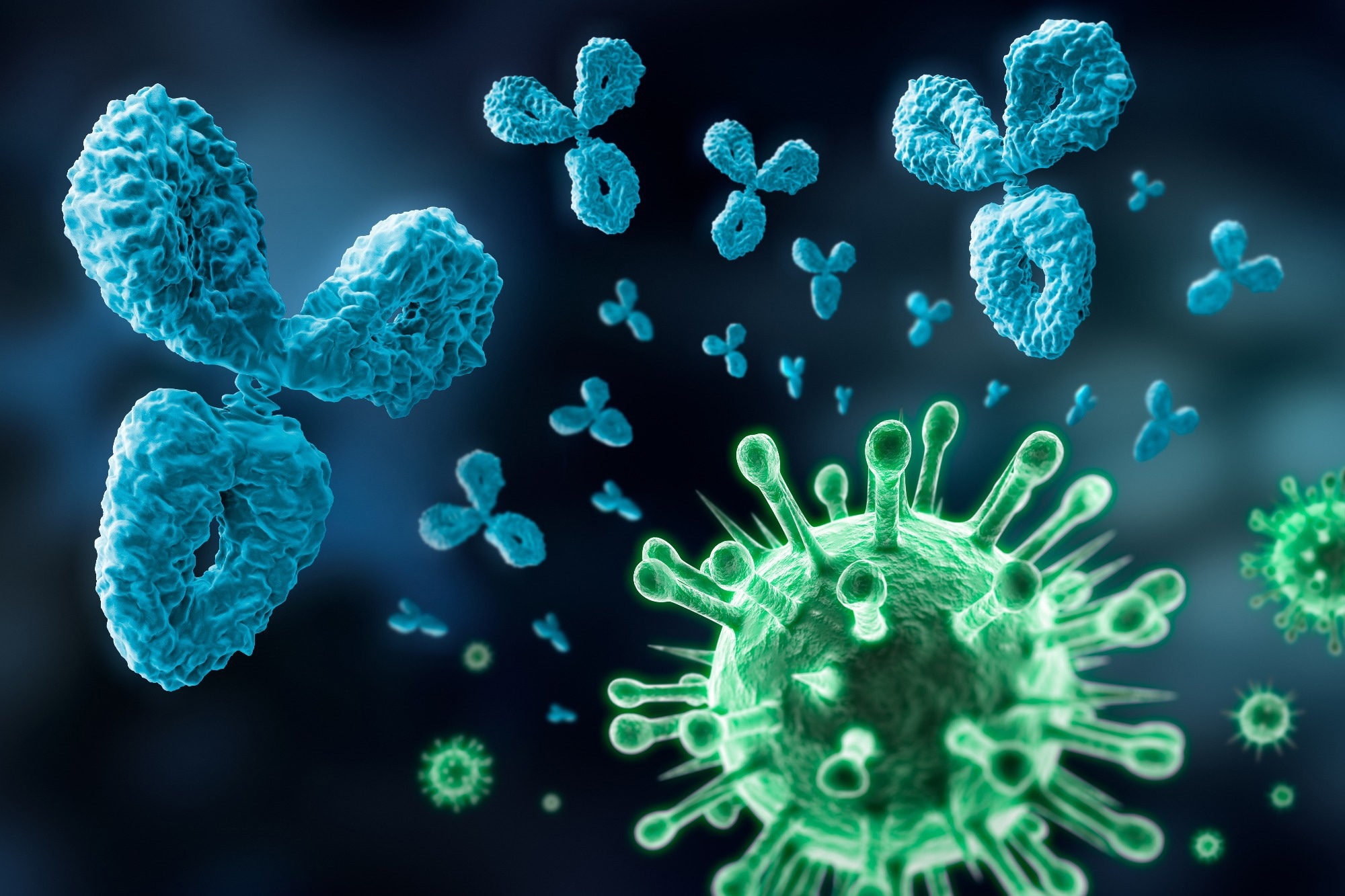The spectrum of coronavirus disease 2019 (COVID-19) manifestation is broad, with convalescent subjects reporting protracted symptoms, a condition termed post-acute sequelae of COVID-19 (PASC) or long COVID. Some evidence suggests the role of virus persistence, autoimmunity, and immune dysregulation in driving long COVID. Nonetheless, the biological mechanisms underlying this condition are not well understood.
Elevated levels of pro-inflammatory cytokines and some chemokines characterize acute COVID-19. Chemokines recruit monocytes and neutrophils to the infection site(s), which play a critical role in COVID-19 pathophysiology. In addition, autoantibodies against interferons and other molecules have been reported in COVID-19; generally, they are associated with adverse outcomes. Nevertheless, no study has comprehensively evaluated autoantibodies against chemokines.
 Letter: Autoantibodies against chemokines post-SARS-CoV-2 infection correlate with disease course. Image Credit: peterschreiber.media / Shutterstock
Letter: Autoantibodies against chemokines post-SARS-CoV-2 infection correlate with disease course. Image Credit: peterschreiber.media / Shutterstock
The study and findings
In the present study, researchers applied a peptide-based strategy to quantify antibodies binding to a functional region of 43 human chemokines following SARS-CoV-2 infection. Plasma samples were obtained from 71 COVID-19 convalescent individuals (Lugano cohort) at an average of six months post-disease onset. Additionally, samples from non-infected individuals served as controls.
Peptides corresponding to the chemokines’ N-terminal loop (N-loop) were designed for use in enzyme-linked immunosorbent assays (ELISA). Peptide-specific immunoglobulin G (IgG) antibodies were measured. Some samples from convalescent individuals exhibited increased IgG levels to specific chemokines—moreover, N-loop-directed antibodies correlated with antibodies against the C-terminus of the same chemokine.
Antibodies against C-C motif chemokine ligand 19 (CCL19), CCl22, and C-X-C motif chemokine ligand 17 (CXCL17) clustered in unsupervised clustering analysis and were defined as the COVID-19 signature. Moreover, the researchers validated this signature in two independent cohorts (Milan and Zurich). The Milan cohort was evaluated during the acute phase and seven months post-onset, while the Zurich cohort was sampled 13 months after disease onset.
Further, the team noted that antibody levels of the COVID-19 chemokine signature did not correlate with half-maximal neutralizing titers (NT50) or IgG levels against the SARS-CoV-2 spike’s receptor-binding domain (RBD). Antibodies against specific chemokines (CXCL7, CCL8, CCL19, CCL8, CCL16, and CCL13) increased at month 12 post-onset relative to month 6. Unlike anti-RBD antibodies that decayed over time, antibodies against some chemokines increased over 12 months.
Only anti-CCL19 antibodies were elevated in convalescents who required hospitalization during COVID-19 than in controls. On the other hand, outpatient convalescents showed higher levels against eight chemokines than controls. Notably, antibodies against CCL25, CXCL5, and CXCL8 were lower in formerly hospitalized convalescents than outpatient subjects.
The COVID-19 signature distinguishing convalescents from controls differed from the COVID-19 hospitalization signature (autoantibodies against CCL25, CXCL8, and CXCL5) associated with disease severity. Next, the team collected data on self-reported symptoms at month 12 using a questionnaire to determine whether chemokine antibodies at month 6 predicted long COVID.
Over 65% of the Lugano cohort participants had at least one persistent symptom. Symptoms were more frequent among hospitalized (72.7%) than outpatient (47.4%) convalescent individuals. Subjects with long COVID, particularly females, and outpatients, exhibited lower cumulative chemokine antibody levels than those without long COVID. However, anti-RBD IgG levels and NT50 titers were comparable between those with and without long COVID.
Antibodies against CXCL13, CXCL16, and CCL21 at month 6 differentiated long COVID from non-long COVID groups, thus defined as long COVID signature. Finally, the team measured chemokine antibodies in patients with Lyme disease, human immunodeficiency virus (HIV)-1, rheumatoid arthritis (RA), Sjögren syndrome (SjS), or ankylosing spondylitis (AS).
They noted elevated antibody levels against 14 chemokines but not against CCL19 in HIV-1-infected subjects relative to healthy controls. Antibodies against CXCL9, CCL4, CCL19, and CCL25 were increased in people with RA, SjS, and RA subjects compared to controls. Plasma from Lyme disease subjects was indistinguishable from healthy controls.
Conclusions
In summary, the researchers demonstrated the widespread occurrence of autoantibodies against chemokines following COVID-19. Elevated expression of specific autoantibodies was associated with favorable disease outcomes. High levels of several chemokines during COVID-19 result in a pro-inflammatory environment in the lungs, contributing to severe illness. The researchers identified a COVID-19 signature (CCL25, CXCL5, and CXCL8) in COVID-19 convalescents.
Since these chemokines draw neutrophils and other cells, promoting inflammation, autoantibodies (against them) imply protection by dampening the inflammatory response. Future studies should ascertain whether anti-chemokine agents could positively impact the early inflammatory phase during COVID-19 and reduce long COVID development.